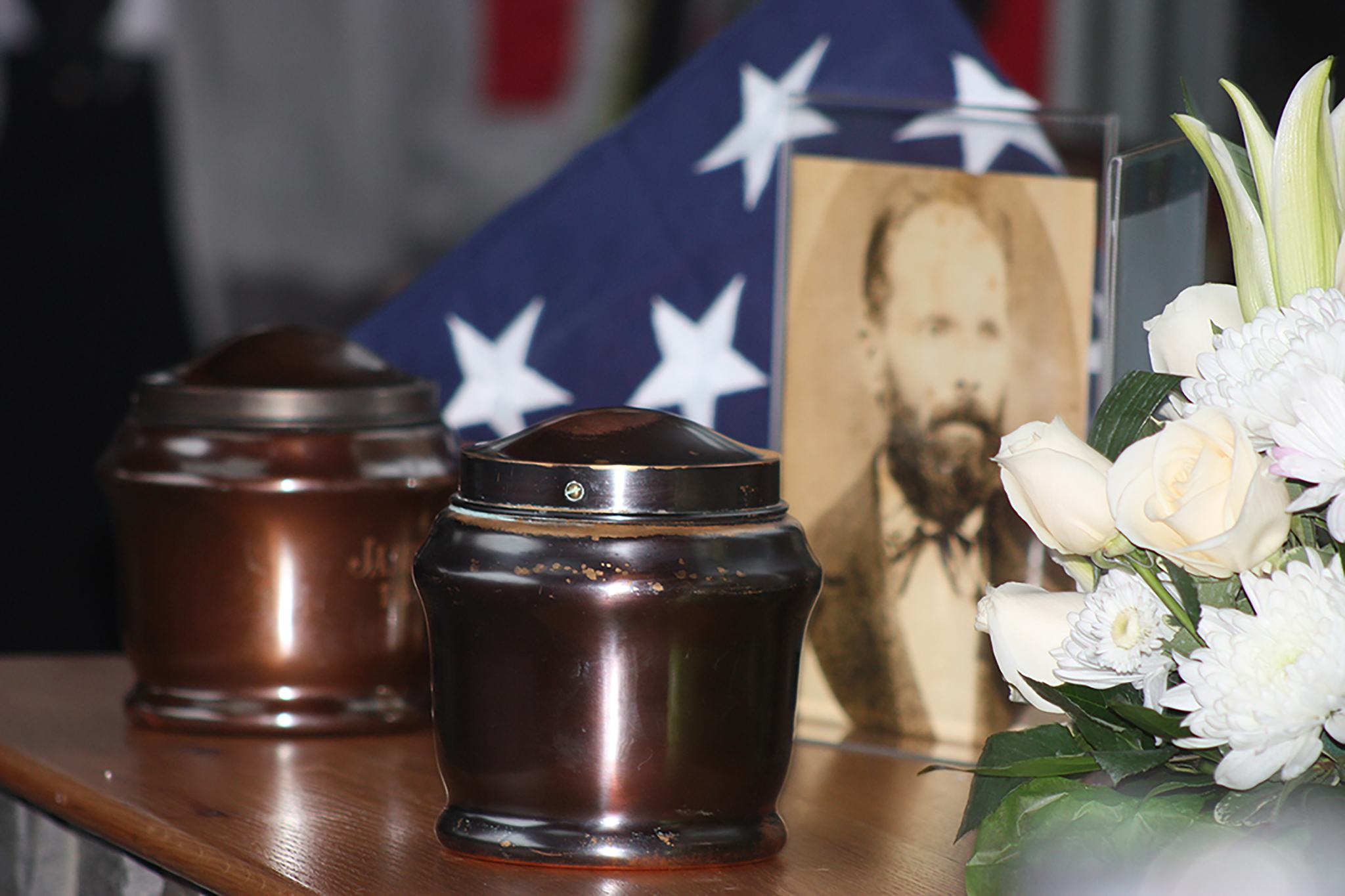If Cory Miller were in the back yard of his Covington home Saturday, he probably would have been able to hear the shots fired from a military honor guard gun salute.
But on cold and damp afternoon, Miller and his family were front-row guests to history and a moving memorial that honored his fourth great-grandfather at Tahoma National Cemetery.
Union Army Pvt. James Powers, a Civil War veteran who died 95 years ago in Seattle, never received a proper military burial. For whatever reason, brass urns containing the cremated remains of James and his wife of 57 years, Irene, have sat in community storage at a Seattle cemetery since his death in 1921 and hers in 1928.
But an effort – led by a Kent couple, with support from the Missing in America Project, genealogists and veteran organizations – soon recognized the problem and worked to ensure that the Powers were properly laid to rest Saturday.
“I loved it,” Miller said of the 1921 ritual, military-style interment of Powers and his wife at the cemetery near Kent, a service that drew about 200 people. “I can’t say thanks enough to everybody for this.
“We knew (our family history) back to his son (Jesse, a Seattle minister) … but that’s as far back as we could get on the lineage. So this was a real surprise to everybody in the family.”
Added Miller’s mother, Glenna, one of the few Powers’ descendants at the memorial: “It’s been very emotional, very exciting and very surprising.”
Powers was the first Civil War veteran to be interred in the state since Hiram Randall Gale, the last Grand Army of the Republic national commander and the last living Civil War veteran in Washington, died in 1951 at the age of 104.
The effort
Jim and Loretta-Marie Dimond are historians who led the records research, verification and permission process to make the memorial possible.
They had the approval of the Powers’ descendents and support of many people, notably Robert Patrick of the Washington chapter of the Missing in America Project; the Puget Sound Civil War Roundtable; the Sons of Union Veterans of the Civil War ((SUVCW); the Washington Civil War Association, re-enactment groups and cemetery leaders.
“This is closure for a story that started in 1921, and we’re finally giving honors to a Civil War veteran that was never done,” said Jim Dimond, a retired federal government worker who is the Western Washington historian for the SUVCW, a volunteer, fraternal, nonprofit educational organization. The SUVCW is similar to its predecessor, the GAR, which was one of the first integrated organizations in the United States and the largest Union Civil War veterans organization at that time.
About the man
James Powers joined the 12th Michigan Infantry in 1864, replenishment for a veteran unit that had seen heavy casualties. But the 5-foot-5, blue-eyed, fair-haired man never saw significant combat, his military service mostly consisting of railroad guard duty and work as a hospital steward in Arkansas, records show.
Discharged in 1865, Powers married Irene, and they raised two sons, Jesse and Frank.
Powers worked in public service. He spent a term in the Michigan Legislature, read and practiced law. He also farmed, and documents in his pension file showed that as he aged the rigors of mechanized farming became more difficult. An accident in 1867 crippled his left arm, according to records.
His health deteriorating, Power suffered a stroke in 1915.
The Powers eventually moved to Seattle in 1920 to be near Jesse, who became a minister and founded the First Unitarian Church.
James Powers died a year later, his wife in 1928. Both were cremated but for unknown reasons, family members never claimed the remains.
Enter the Dimonds
The Dimonds have a great appreciation for American history and for those who put their lives on the line to protect the land of the free.
Their work with the Sons of Union Veterans, which maintains a registry of burial locations of Civil War veterans, is a worthwhile extension of their passion for history and family. Both of their fathers were World War II veterans.
“It’s important because I love history, family history and my father’s background in the military,” Jim Dimond said. “All those things together make it extremely important to me.
“And the fact we’re accomplishing this with the family present is just way beyond anything I ever expected,” he said. “It’s a very incredible, wonderful experience.”
Talk to us
Please share your story tips by emailing editor@kentreporter.com.
To share your opinion for publication, submit a letter through our website https://www.kentreporter.com/submit-letter/. Include your name, address and daytime phone number. (We’ll only publish your name and hometown.) Please keep letters to 300 words or less.

